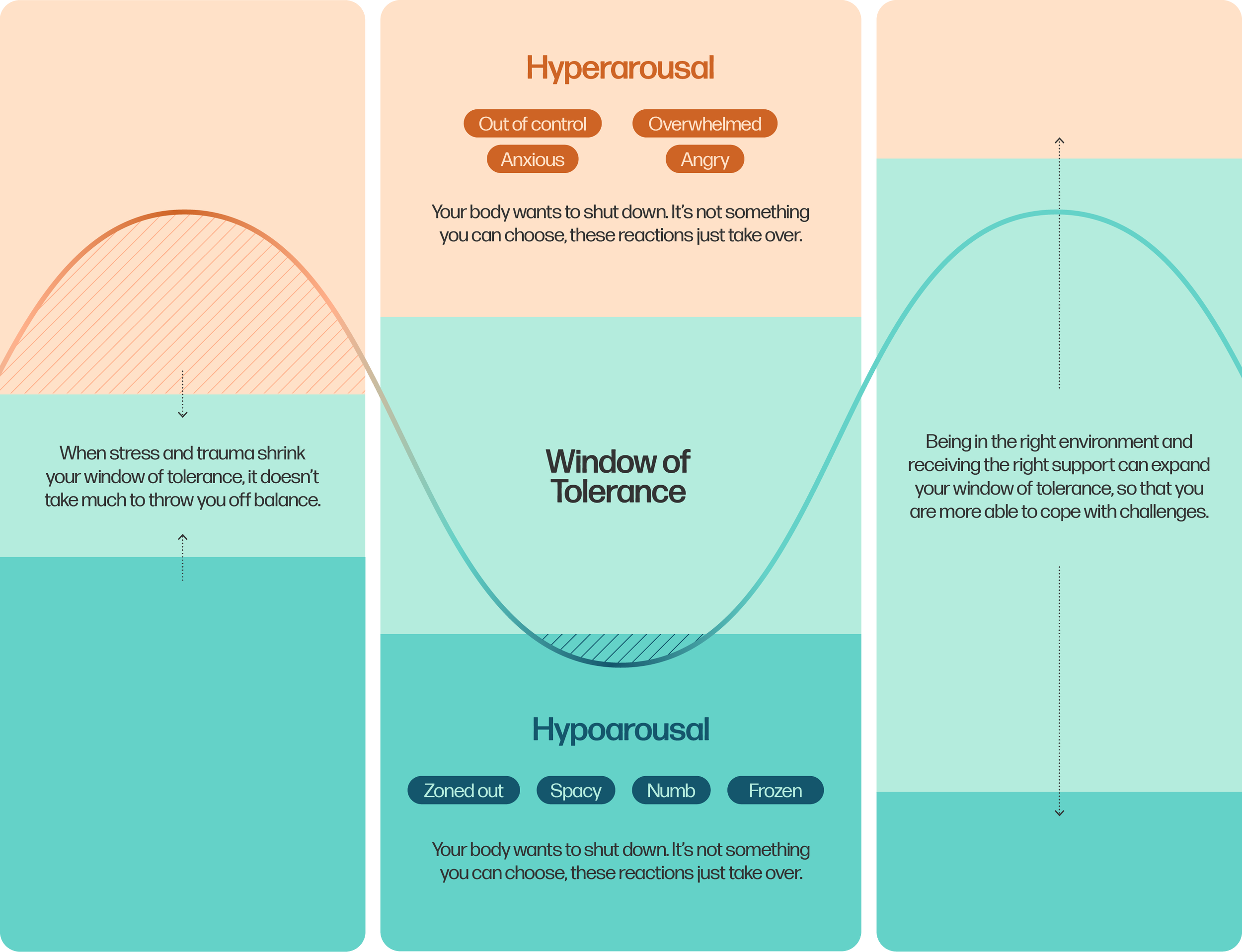Creating Neurodivergent-affirming organisations
In this blog, Kay Louise Aldred, NdC’s Development Lead, shares an insight into core elements of our Neurodivergent Wellbeing Approach training and explores why nervous system regulation and trauma-informed approaches are essential to creating Neurodivergent-affirming organisations.
If you are interested in promoting Neurodivergent-affirming change within your organisation and are motivated to explore nervous system regulation and trauma-informed approaches, our signature training program, the Neurodivergent Wellbeing Approach (NdWA), is returning soon. Two cohorts will run between October and December, and we taking bookings now!
Regulation refers to the ability to handle stressors and effectively process, digest, and complete the activation of our nervous system (which can manifest as fight, flight, fawn, or freeze responses) without exceeding our capacity or going beyond our ‘Window of Tolerance’, also known as our zone of resilience, and so safeguarding against trauma (Siegel, 1999). Regulation is crucial in the workplace because when staff are regulated, they can provide co-regulation to others, which helps support team regulation as well. This process increases both psychological and felt-sense safety, thereby reducing risk and increasing sustainability. Therefore, fostering a culture that prioritises staff well-being, nervous system health and regulation is essential for safeguarding, delivering high-quality support and ensuring the overall success of the organisation.
This bottom-up approach in organisations focuses on the body first, addressing physiological needs and sensory aspects first, before moving on to emotional processing. It is based on the understanding that the body and mind are connected, and that dysregulation in the nervous system can lead to heightened emotional states, mental health issues and stress. Getting the sensory environment in organisations right is Neurodivergent-affirming in and of itself, due to hyper and hypo sensory differences of Neurodivergent individuals. By tending to the body’s needs and sensory environment first, this approach can make workplaces feel safer, less stressful, and more grounded – improving recruitment and retention of a diverse workforce.
The Window of Tolerance model by Dr Daniel Siegel.
Understanding nervous system regulation is foundational for creating Neurodivergent-affirming and trauma-informed approaches, both at an individual and organisational level. Here are six ways how this understanding can contribute to more effective, inclusive, and long-lasting change.
1. Enhancing Self-Awareness and Regulation
By recognising how nervous system states (such as sympathetic activation; fight, flight, freeze, fawn, or social engagement responses) influence our behaviours and reactions, individuals can better understand their behaviours, emotions and body sensations, especially under stress. For Neurodivergent individuals, sensory and environmental factors, as well as social processing, may impact their nervous system regulation differently. Awareness and tools for self-regulation can empower people to manage their needs in ways that are proactive and adaptive, rather than through reactivity.
2. Supporting Authentic Connection and Belonging
In both social and professional settings, a dysregulated nervous system can create barriers to genuine connection, leading to misunderstandings or tension. By promoting environments that respect individual needs for communication and interaction styles, organisations can foster a sense of belonging and reduce the likelihood of stress and burnout.
3. Creating Safe, Supportive Environments
Trauma-informed approaches prioritise safety, trustworthiness, and choice, aligning with an understanding of the nervous system’s need for a stable, predictable environment. Organisations that embed these principles can make Neurodivergent employees feel more at ease, reducing the likelihood of triggering nervous system responses that may otherwise hinder engagement and productivity.
4. Building Nervous System and Trauma-Informed Policies and Practices
Trauma-informed policies that recognise diverse nervous system responses can shape how feedback is given, how workloads are managed, and how inclusivity is practised. These policies consider how people’s responses to stress, workload, or social processing differences may be based on their trauma history and neurotype.
5. Reducing Stigma and Promoting Inclusion and Equity
By acknowledging Neurodivergent and trauma-informed needs, organisations can reduce stigma, validating each person’s experiences as a legitimate part of the workplace. This mindset encourages inclusivity and equity by normalising embodiment, lived experience, unique needs and reactions, creating a culture that sees a diversity of neurotypes as an asset rather than a burden.
6. Driving Sustainable Change
When individual nervous system regulation is supported at every level, from personal development to organisational policy, people begin to feel psychologically safe, less stressed and have improved wellbeing. This safety can lead to more authentic participation, creativity, and resilience, which are crucial for meaningful, lasting change in any workplace.
The Neurodivergent Wellbeing Approach is a holistic, Neurodivergent-friendly wellbeing curriculum that offers a reflective space, education, and practical strategies. This programme is based on the concept of ‘experience to share’ and is designed to promote self-reflection and the wellbeing of participants, which they can then model and share with those they care for and support. The only requirement is a willingness to self-reflect and a genuine interest in learning about embodiment and creative approaches.
References
Siegel, D. J. (1999). The developing mind: How relationships and the brain interact to shape who we are. Guilford Press.


